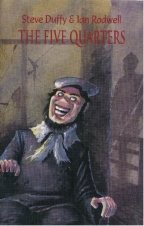The Five Quarters
Steve Duffy & Ian Rodwell
Ash Tree Press
US Hardcover First/500 copies
ISBN 1-55310-027-1
246 Pages; $39.00
Date Reviewed: 03-18-02
Reviewed by: Rick Kleffel

REFERENCES
COLUMNS
|
|
|
The Five QuartersSteve Duffy & Ian RodwellAsh Tree PressUS Hardcover First/500 copiesISBN 1-55310-027-1246 Pages; $39.00Date Reviewed: 03-18-02Reviewed by: Rick Kleffel |
|
|
REFERENCES |
COLUMNS |
It will probably come as no surprise that an air of M. R. James permeates the general vicinity of 'The Five Quarters'. What will come as a surprise, however, is the power with which the book establishes itself, its own identity. What will come as a surprise the beautiful, silky prose, fine wine for the mind. But having gone far enough to enjoy the prose and the power of Duffy and Rodwell's imagery, the reader will no longer be surprised by their utterly original take on the classic ghost story. In 'The Five Quarters', Duffy and Rodwell do no less than move the entire superstructure of the antiquarian ghost story ahead a century. They preserve the charm, the wit, the sophisticated feel of those earlier scholarly works. But by setting the action in the 20th century, as opposed to the 19th century, they manage to do more than just update the proceedings. They bring them into a whole new light, and make us realize that days and times frequently resurrected in garish recreations can be seen through the same wistful eyes that once gazed longingly on the 19th century. They help us understand that the last century is now history.
'The Five Quarters' uses a classic structure to tell its tales. Five lonely gentlemen, with little else to occupy their lives, gather infrequently to socialize, and as they do, in each successive story, one character finds himself telling a tale of the uncanny. From the scholarly and smooth Mr. Gliddon, who begins proceedings with a story of Provencal, to Mr. May, who tells the story of a rotting seaside resort pier, the fussy solicitor Scaife, who admits to an unnatural experience while driving in the countryside, to the quiet Mr. Ashworth, who tells of visiting a lonely museum exhibit when he ran a pharmacy 'back in the mid sixties', to the annoying and unbelieving Mr. Wilde who scoff through all the first four tales, each of the characters speaks in a distinctly different voice. The writing in these passages is like that of a musician playing a mournful solo on a different instrument, united by theme but different in timbre. The sheer act of reading is a joy.
The final tale 'Uneasy Lies the Head', involves each of the characters, even the obstreperous Mr. Wilde. The story is told in a chain fashion, one speaker after another. The establishing of the voices early in the preceding tales helps this story build in a similarly musical fashion, as the solo parts entwine and combine to create something bigger than any of its constituent parts. The esteemed M. R. James plays a bit of a part in this tale.
Rounding out the volume are 'Notes on the Stories' by Steve Duffy. This offers a kind of instant analysis and extras section. Duffy has done the work for those in the future who might have to try to unearth and examine 'The Five Quarters', in the way that Ash Tree Press itself did the work to annotate the work of M. R. James in 'A Pleasing Terror'. The playful, scholarly look at how the stories came about is a fascinating look at the creative process. It is to the book what the director's commentaries and mini documentaries about filmmaking are to today's DVD's.
But in the end, it is the writing that will hook you, the writing that will keep you reading, the writing that will create for you the lost world of the last century. It's a bit hard to face how quickly we age, how our own well-remembered youths turn into out children's ancient history, indistinguishable from that of Ancient Rome. In 'The Five Quarters', Steve Duffy and Ian Rodwell manage to light the face of our own yesterdays and throw back the shadow of dusty death, waiting forever ahead of us.